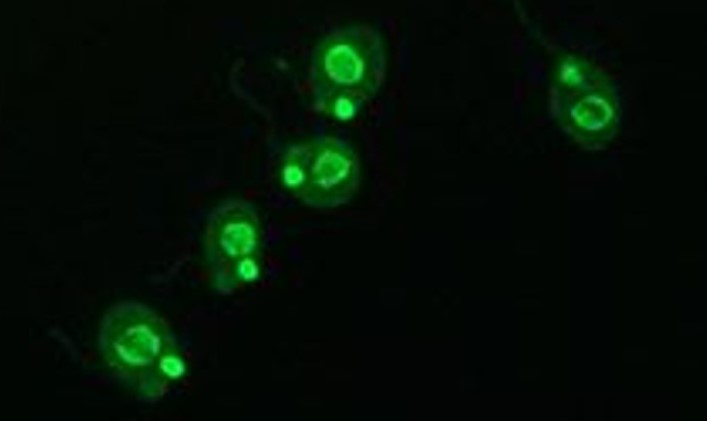81050, 81100 – nDNA IFA plus

Highlights
• Slides coated with Crithidia luciliae
• Specific detection of IgG antibodies against double-stranded DNA (dsDNA)
• Support for the diagnosis of systemic lupus erytematosus (SLE)
• Qualitative and semi-quantitative determination of IgG antibodies
• Ready-to-use reagents (exception: wash buffer)
• Quality assured handling in routine laboratories
• Short incubation times (30 min / 30 min) at room temperature
• Consistent processing for the parallel use of multiple IF assays
• High diagnostic sensitivity and specificity
• CE marked
Intended Purpose
The nDNA IFA plus is an immunofluorescence assay (IFA) for the qualitative and semi-quantitative determination of IgG antibodies in human serum against double-stranded DNA using Crithidia luciliae haemoflagellates. The nDNA IFA plus is intended as an aid in the diagnosis of systemic lupus erythematosus in conjunction with other clinical and laboratory findings. The immunoassay is designed for manual professional in vitro diagnostic use.
Diagnostic Relevance
Systemic lupus erythematosus (SLE) is an autoimmune disease that manifests with the formation of antinuclear antibodies (ANA), particularly antibodies against double-stranded deoxyribonucleic acid (dsDNA). The disease is rare. Women are more frequently affected than men. Depending on which organs or organ systems are affected, systemic lupus erythematosus manifests with different symptoms, which can also change over the course of the disease. Butterfly erythema occurs in a large number of patients and spreads symmetrically from the bridge of the nose to the cheeks. Furthermore, general symptoms such as fatigue, fever and weight loss are often described.
The diagnosis is made on the basis of the clinical symptoms and laboratory medical examinations. The clinical suspicion is based in particular on the detection of anti-nuclear antibodies (ANA). Antibodies against double-stranded deoxyribonucleic acid (dsDNA) are pathognomonic for systemic lupus erythematosus (SLE). They occur in about 65 % of patients and, along with antibodies against Smith antigen (Sm) and against phospholipids, are part of the classification criteria of American and European rheumatologists (ACR: American College of Rheumatology, EULAR: European League Against Rheumatism).
Crithidia luciliae is a eukaryotic, protozoan parasite of the Trypanosomatidae family. A so-called kinetoplast in a large mitochondrion, which essentially consists of circular, double-stranded deoxyribonucleic acid (DNA), is characteristic of this microorganism. The high concentration of DNA in this kinetoplast and the simultaneous absence of other human nuclear antigens makes Crithidia luciliae so valuable for the specific detection of antibodies against dsDNA in the immunofluorescence assay (IFA).
Product Specifications
| Title | nDNA IFA plus |
| Product code | 81050 or 81100 |
| Indication | Systemic lupus erythematosus |
| Description | Immunofluorescence assay (IFA) for the determination of IgG antibodies against dsDNA in human serum |
| Format | Slides coated with Crithidia luciliae |
| Total incubation time | 60 min. |
| Sample volume | 20 µL serum |
| No. of determinations | 60 (10 x 6) or 120 (10 x 12) |
Free downloads
Flyer [REF 81050, 81100][eng] Flyer [REF 81050, 81100][deu] SDS [REF 81050, 81100][eng] SDS [REF 81050, 81100][deu]Restricted downloads - Password required
Current version of the instructions for use. The respective valid version for processing the test can be found in the product packaging.
